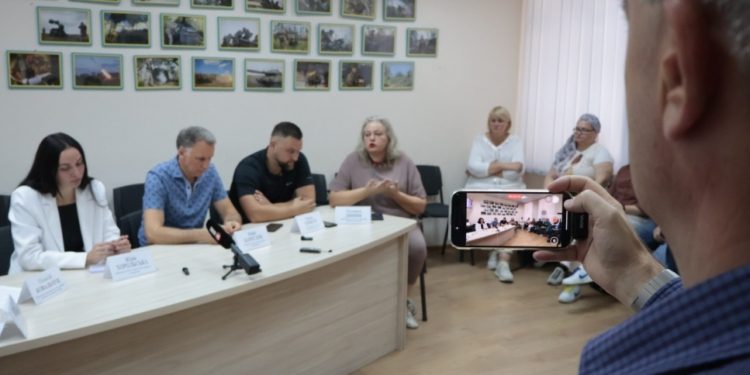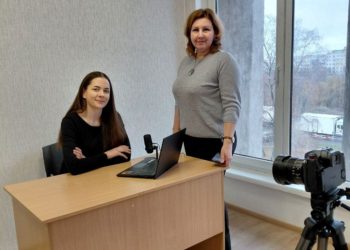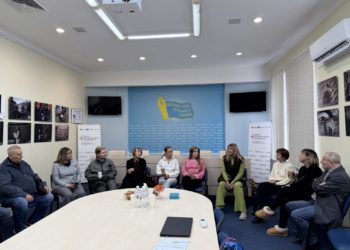Media workers from the Dnipropetrovsk, Donetsk, and Kherson Regions gathered at a round table in the Dnipro Journalists’ Solidarity Center (JSC) of the National Union of Journalists of Ukraine (NUJU). The topic of discussion was quite complicated and extremely relevant. They talked about the media in conditions of relocation, adaptation of the team, support and communication with the audience.
Support and experience
After the full-scale invasion of the russian federation into the territory of Ukraine, many journalists and newsrooms left the occupied and front-line territories for safer settlements. At the same time, they continued to work for their audience. Journalists from the Donetsk, Luhansk, and the Kherson Regions found refuge in the Dnipropetrovsk Region. Due to the aggravation of the situation at the front, media workers from Pokrovsk and Myrnohrad are leaving.
“From the first days of the full-scale invasion, we became a kind of hub for colleagues who left dangerous cities. Some went further a few days later to the western regions. Some stayed. Today, we continue to receive media workers fleeing the war. Of course, evacuation was different then and now,” said the Board Chairman of the Dnipropetrovsk regional organization of the NUJU, Oleksii Kovalchuk.
In addition to the safety of journalists, an important priority of the Union‘s activities is to support the media. And so, the difficult economic situation in newsrooms has significantly worsened due to the war. Some newspapers have stopped publishing, and TV channels and radio stations have stopped broadcasting.
The coordinator of the Dnipro JSC, Nataliya Nazarova, drew attention to the fact that in 2022, the NUJU created a network of JSCs to help colleagues who have suffered due to military actions materially, technically, and informationally. A free legal hotline is available for media workers, protective equipment is rented, and psychological support is provided. In addition, security training sessions, educational events, webinars, and seminars are constantly held. The centers also operate as coworking spaces. Such hubs have been launched in six cities based on regional journalism centers. One of them is located in Dnipro. This time, colleagues were invited to the regional community center to share their difficult experience of working in front-line areas, as well as their experience of relocating their media, adapting their team, and supporting them.
Experience of media workers from Pokrovsk
Yurii Barkulov is the head of the Orbita TV company from the city of Pokrovsk in the Donetsk Region. He shared his story and experience of relocation. By February 2022, the television company employed more than 60 people. The Orbita premises were first damaged by enemy shelling in January 2023. The equipment was moved to another building, and the team continued to work.
The audience of the Orbita TV company is residents of Pokrovsk and the Pokrovsk district. Therefore, the news is interesting, first of all, to the local population.
The director of the Capri TV LLC, Yuliya Khorolska, was forced to leave and evacuate the team from Pokrovsk when the situation at the front worsened. Until September 1 of this year, Capri covered most of the Donetsk Region. Broadcasting was conducted in Pokrovsk, Kostiantynivka, Kramatorsk and adjacent territories.
People need us
Media workers from the Dnipropetrovsk Region also joined the discussion, who work practically on the front line. The settlement of Mezhova and the administrative border with the Donetsk Region are separated by only nine kilometers. Despite all the challenges, the Mezhivskyi Meridian newspaper has not omitted a single issue; the team fills the website leads social networks.
“I am pleased to meet with colleagues today. Unfortunately, the reason for these meetings is not joyful. We understand that the front is moving. The distance between Mezhova and Pokrovsk is 35 kilometers. Despite this, we are working. Our newspaper is 94 years old, and the staff would like to celebrate its 95th anniversary at home. We have applied for a subscription catalog for next year. But the newsroom has no idea how to conduct a campaign. Residents say frankly that they do not think about subscribing to newspapers because they are practically packed and ready to go and do not know where they will be in six months. Subscriptions are the main source of funding. There is practically no advertising. Of course, they are very supportive of grant projects; thanks to them, we stay afloat,” Yevhen Khrypun, the editor-in-chief of Mezhivskyi Meridian, shared his experience.
According to the editor, there are many IDPs living in the community. Over 5,000 is only the officially registered number. These people have become the heroes of the articles, and they receive a considerable request for information, citizens are interested in where to find housing, where to get humanitarian aid, and so on.
“We also have a problem with personnel. The team is only three people. We are looking for media workers because we have the courage to work. The community needs us, so we can’t just give up and leave,” added Yevhen Khrypun.
The housing issue is acute
During the period of the full-scale invasion, the Dnipro regional organization of the NUJU not only maintains a dialogue with the authorities and partners, but also joins forces with public organizations. In particular, the Source of Support non-governmental organization. The head of this organization and a member of the Dnipro IDP Council, Liudmyla Dinnik, emphasized that the organization is now directing its efforts to address the housing issues of IDPs.
“At the beginning of the full-scale invasion, we organized four shelters for displaced people. Two of them are still operating. At first, we hoped that people would quickly return to their homes, but then later, we realized that the war would last more than one month. There is an understanding that incredible funds are needed to meet the housing needs of IDPs. Of course, we can wait for the state to allocate funds in accordance with the programs. But our country is at war, and the budget is devastated. Therefore, we advise combining the efforts of IDPs, the media, and the public sector,” emphasized Liudmyla Dinnik.
Currently, Source of Support oversees housing programs at the level of the Dnipropetrovsk Region. We managed to do something. In Pidhorodne, the land was allocated for the development of IDP housing, and several more hectares were also allocated for development by one public organization. Documents regarding this specific case were submitted to donors in order to obtain funding.
In addition, as Ms. Liudmyla said, the NGO’s team is developing an online service that will allow IDPs who need housing to register. They are also working on an IDP service card – a pilot project at the Dnipro level. This will make it possible to receive discounts on goods and services from Dnipro businesses. And for forcibly displaced people – it will help save money. The third service that public activists plan to create is information about all operating hubs, centers, and organizations that provide assistance to IDPs.
Call the Dnipro JSC by dialing 050 919 8479 (JSC coordinator Nataliya Nazarova). The Center is located at 8 Starokozatska Street.
ABOUT JSC
The Journalists’ Solidarity Centers is an initiative of the NUJU implemented with the support of the International and European Federations of Journalists and UNESCO. The initiative is designated to help media representatives working in Ukraine during the war. The Centers operate in Kyiv, Lviv, Ivano-Frankivsk, Chernivtsi, Zaporizhzhia, and Dnipro and provide journalists with organizational, technical, legal, psychological, and other types of assistance.
ABOUT UNESCO
UNESCO is the United Nations Educational, Scientific, and Cultural Organization. It contributes to peace and security by promoting international cooperation in education, sciences, culture, communication, and information. UNESCO promotes knowledge sharing and the free flow of ideas to accelerate mutual understanding. It is the coordinator of the UN Action Plan on the Safety of Journalists and the Issue of Impunity, which aims to create a free and safe environment for journalists and media workers, thus strengthening peace, democracy, and sustainable development worldwide. UNESCO is working closely with its partner organizations in Ukraine to provide support to journalists on the ground.
The designations employed and the presentation of material throughout this digest do not imply the expression of any opinion whatsoever on the part of UNESCO concerning the legal status of any country, territory, city, or area or its authorities or concerning the delimitation of its frontiers or boundaries.
The authors are responsible for the choice and the presentation of the facts contained in this digest and for the opinions expressed therein, which are not necessarily those of UNESCO and do not commit to the organization.
Dnipro JSC information service
Photo: by Viktor Kachanov

 THE NATIONAL UNION OF
JOURNALISTS OF UKRAINE
THE NATIONAL UNION OF
JOURNALISTS OF UKRAINE
















Discussion about this post